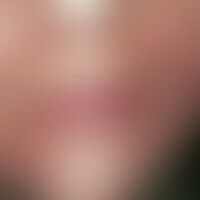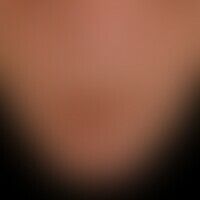Image diagnoses for "red"
857 results with 4400 images
Results forred

Tinea faciei B35.06
Tine faciei: Plaque that has existed for several months and has been pretreated in different ways and has a pronounced edge.

Lupus erythematosus tumidus L93.2
Lupus erythermatodes tumidus:chronic recurrent disease patternforseveral years. no itching, no other subjective complaints. significant improvement of symptoms under therapy with antimalarial drugs.

Teleangiectasia I78.8
Teleangidectasia: irregular caliber, in places ectatic capillaries in a nodular basal cell carcinoma.

Erythroplasia queyrat D07.4

Cold urticaria L50.21
Coldurticaria. cold provocation test: A cold pack was applied to the patient's forearm for 20 minutes and fixed with a gauze bandage. Only a few minutes after exposure to cold, the patient reported itching, and when removing the pack, this flat urtica was clinically evident.

Atopic hand dermatitis L20.8
Hand eczema atopic: previously known atopic eczema with variable course; the skin lesions on both palms have existed with varying intensity for several years.

Vasculitis (overview) L95.8

Lymphomatoids papulose C86.6
lymphomatoid papulosis: previously known recurrent clinical picture in a 34-year-old female patient. rapid, painless knot formation within 14 days. this finding healed spontaneously scarred under central necrosis after 3 months. below the large knot a recently formed new focus.

Contagious impetigo L01.0

Perioral dermatitis L71.0

Hypertrophic Lichen planus L43.81
Lichen planus verrucosus: grouped, red, itchy, plaques that have existed for several months with a roughened, verrucous surface.

Folliculitis barbae L73.8
Folliculitis barbae: Chronic, therapy-resistant, inflammatory, itchy (lesions show signs of scratching) follicular papules in the area of the cheeks

Primary cutaneous diffuse large cell b-cell lymphoma leg type C83.3
Primary cutaneous diffuse large-cell B-cell lymphoma leg type: Detail magnification: Approx. 4-5 cm diameter, irregularly shaped, bulging, deep red tumor with smooth surface of a 75-year-old patient.

Rosacea fulminans L71.8
Rosacea fulminans: a peracute clinical picture with fluking, painful nodules; development of undermined ulcers.

Carcinoma of the skin (overview) C44.L
Carcinoma of the skin: a continuously growing lip carcinoma that has existed for years.

Merkel cell carcinoma C44.L
Merkel cell carcinoma: detailed image of a rapidly growing, symptomless red node.

Artifacts L98.1

Psoriasis palmaris et plantaris (plaque type) L40.3
Psoriasis palmaris et plantaris (plaque type): red and scaly, markedly indurated plaques on the palm of the hand. Sharp border to the flexor side of the forearm. This sharp transition to the unaffected skin differentiates palmar psoriasis from "hand eczema".






